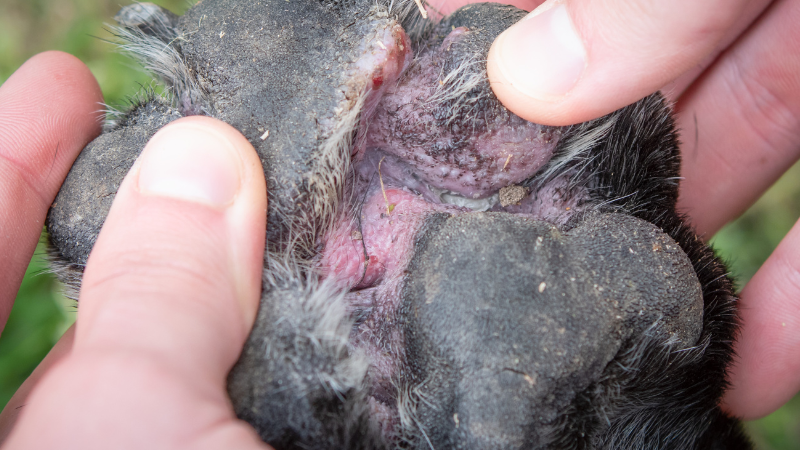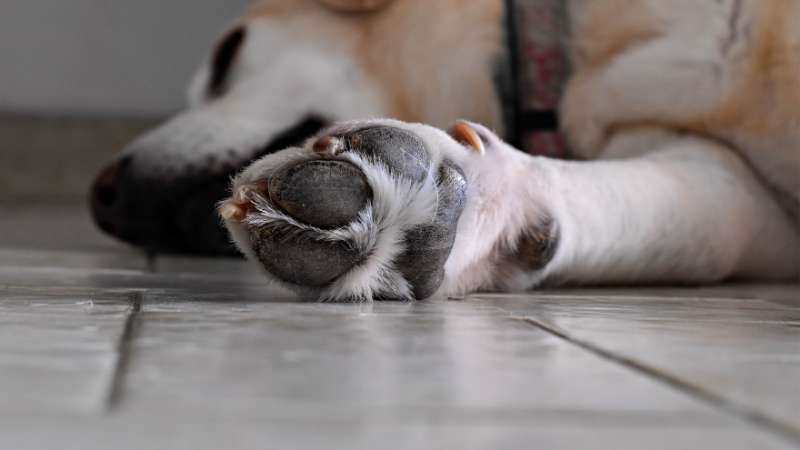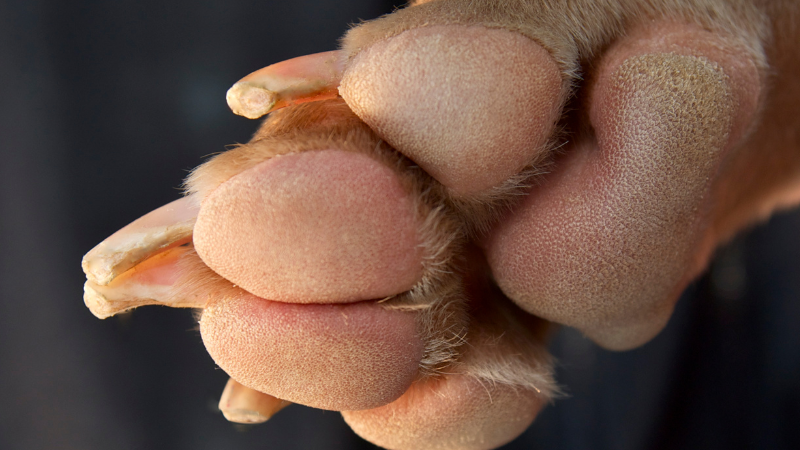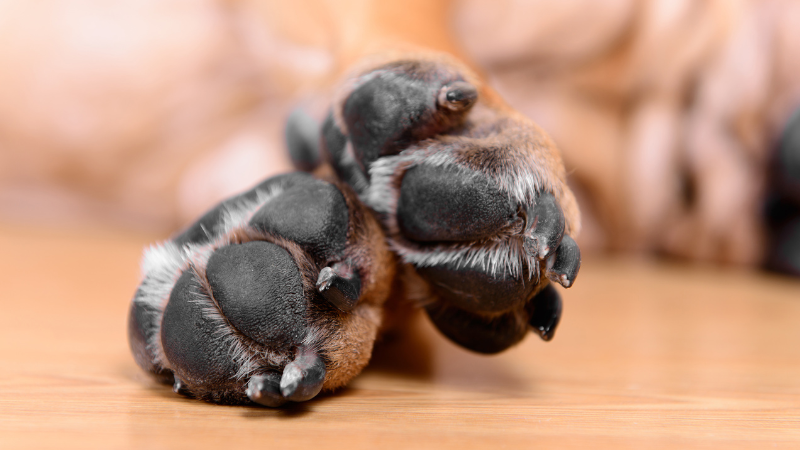Quick Solutions for Soothing Dog Paw Swollen – Expert Tips Inside!

One of the saddest things that can happen to a dog owner is to witness their pet experiencing pain. One of the most common issues dogs face is a dog paw swollen. Imagine your canine companion hobbling or having trouble walking due to this uncomfortable skin condition.
As a responsible dog owner, it is essential to have a thorough understanding of what causes your dog’s foot or paw to swell, how to recognize the indicators of this condition, and what procedures to take to offer your four-legged friend the best possible treatment.
In this article, we will dig into the world of canine pain and investigate the wide range of factors (including allergic reaction) that might lead to a dog’s paw pad being swollen.

Identifying the Signs
If you’re a responsible dog owner, you know how important it is to watch for any trouble signals.
As an obvious outward sign, a swollen paw is not hard to detect at all. There is a possibility that the paw of your dog will get reddened, puffy, or even noticeably larger.
Your canine companion can also act more sensitively or be reluctant to put weight on the paw afflicted by the condition.
Keep a close watch out for any changes in your dog’s behavior, such as excessive licking or biting of the front paw pad, since these can be obvious signs of discomfort your dog is experiencing. Also, pet parents must use some topical therapy on foot pads before taking their dog to the vet.
Furthermore, skin scrapings, skin cytology, and urine tests can also aid in identifying paw inflammation or a dog’s swollen paw especially due to insect bite or due to squamous cell carcinoma.
Potential Causes of Swollen Paws
Injuries and traumatic experiences
Injury or trauma is one of the most prevalent causes of swollen paws in dogs and is one of the most common causes of paw problems overall. Dogs are inherently inquisitive and daring creatures and strongly desire to investigate the world around them. During their adventures, they may inadvertently tread on pointed items, become caught in prickly plants, or sustain injuries from falling. These mishaps can result in lacerations, scratches, sprains, or fractures to dogs paws, all of which can cause the paw to swell.

Allergic Reactions (Especially Food Allergies)
Just like people, dogs are susceptible to allergic responses (food or seasonal allergies) that cause swelling and inflammation in their bodies. An allergic reaction, which most dogs manifest as swollen paws, can be triggered in your dog by allergens such as certain foods, bug stings, or environmental factors such as pollen or grass.
When determining which allergy is to blame for your dog’s symptoms, it is critical to keep a careful eye on your pet and note any patterns in the area in which they live or the dog’s diet they eat. Also, try to take some paw pads sample to your vet so that they can identify the cause of swollen paw pads by performing bacterial and fungal cultures on samples.
- Insect Bites and Stings
Your dog may come into contact with insects such as bees, wasps, or ants when participating in outdoor activities which leads to the dog’s swollen paw. Your four-legged buddy may experience discomfort and even agony due to localized swelling brought on by insect bites, yeast infections and stings. Your dog may need emergency medical assistance immediately, depending on the severity of the infection and the response.
For more in-depth information on dog paw swelling and its underlying causes, refer to the research article “Causes of Canine Paw Swelling” published in the Journal of Veterinary Medicine.
A Heartwarming Tale
Let me tell you a tale that will melt your heart about a Golden Retriever named Max who had a swelled paw and how his owner, Sarah, addressed the problem with the finest care and compassion.
Max and Sarah took their daily stroll in the park on a particularly bright and beautiful afternoon. Suddenly, he let out a painful howl; Max, the exuberant retriever he is, was going for his beloved tennis ball.
When Sarah arrived at his side, she saw Max favoring his foot and using his right paw. After a more thorough physical examination, she discovered his paw was swollen and painful.

Sarah worried about her four-legged friend, opted to take Max back to their house and promptly phoned the animal hospital. The veterinarian recommended that Sarah keep Max quiet and elevate his paw to lessen the swelling.
Following an exhaustive investigation, the veterinarian concluded that Max had most likely trodden on a thorn, which had resulted in a minor puncture wound that ultimately led to swelling.
Sarah was given instructions to constantly observe Max for any changes and given a pain reliever prescription after the veterinarian treated Max’s wound, which included cleaning and dressing it.
Sarah ensured Max was as comfortable as possible over the few days he needed to rest by constructing a snug space with his favorite blanket and toys.
Preventing Swollen Paws
As the saying goes, prevention is better than cure. Even though certain instances of paw swelling are unavoidable, you as pet owners can take measures to reduce the likelihood of them occurring and keep your furry companion safe and healthy.
Regular Paw Checks
It would be best if you made it a routine to check your dog’s paws regularly, especially after they have been outside. Examine their paws for any damage symptoms, including redness that might signal discomfort or foreign items stuck between their paw pads.

Proper Grooming
It is imperative that you keep the paws of your dog clean and well-groomed at all times. It is important to keep the hair surrounding their paw pads trimmed regularly to avoid dirt and debris from building up and creating pain.
Avoid Harmful Substances
Monitor where your dog goes, and keep them away from locations treated with potentially hazardous chemicals or pesticides. These compounds can irritate your dog’s paws excessively, resulting in swelling or allergic responses.
When to Seek Veterinary Care?
Although certain cases of swollen paws may be treated at home with the appropriate care, there are other cases in which the assistance of a qualified veterinarian is required.
You should seek emergency medical assistance if your dog’s swollen paw is accompanied by serious pain, fever, or pus-like discharge from the affected area.
If the swelling does not lessen or worsens after a day or two of treatment at home, you should make an appointment with your veterinarian for a comprehensive examination.
Any indication of clinical signs of fatigue, lack of appetite, or alterations in behavior should be taken carefully and brought to the attention of a veterinarian as soon as possible.
Additionally, for further scientific insights on paw inflammation, you can explore the research article “Evaluating Paw Swelling in Dogs: A Comparative Study,” available in the Journal of Animal Health.
FAQs About Dog Paw Swelling
What causes a dog’s paw to swell?
A dog’s paw can swell for various reasons, including injuries and trauma from stepping on sharp objects or getting entangled in bushes, allergic reactions to certain foods, insect bites, or environmental factors like pollen or grass.
How can I determine if my dog’s paw is swollen?
A swollen paw can be recognized by its outward manifestations, which may include redness, puffiness, or an increase in the overall size of the paw. Your dog may also exhibit other symptoms, such as a limp or a reluctance to put weight on the paw that is afflicted by the condition.

Is there anything I can do at home to treat a swollen paw?
You may be able to manage a swollen paw at home by ensuring that your dog is calm, elevating the dog’s paw health enough to lessen the amount of swelling, and administering anti inflammatory medication if required.
However, It is essential to keep a careful eye on your dog’s feet and, if the swelling does not subside or worsens, to talk to your vet about getting an accurate diagnosis and the appropriate treatment.
How can I prevent the paws of my dog from becoming swollen?
To prevent your dog’s paws and toes from swelling, you can:
- Regularly check and clean your dog’s paws, especially after outdoor activities.
- Trim the hair around their paw pads to prevent debris buildup.
- Take care not to expose your dog to any potentially hazardous substances or chemicals that may be present in its environment.
My dog was stung by a bee, and their paw is swollen. What action should I take?
Be on the lookout for any indications of an allergic response if your dog gets stung by a bee and develops swollen paws.
Seek emergency medical attention for your pet at a veterinary facility if it displays severe symptoms such as difficulty breathing, face swelling, or collapse.
If the response is only minor, you can apply a cold compress to the swollen region and contact your veterinarian for additional instructions.
Is a swollen paw always a cause for concern?
Some cases of swollen paws may be treated at home with the appropriate care, while others may require medical treatment from a veterinarian.
If the swelling continues for an extended period, is accompanied by extreme pain, or if your dog’s personality changes, it is recommended to visit your veterinarian so that any potential underlying disease or health concerns may be ruled out.

Can I give my dog any over-the-counter pain medication for their swollen paw?
No, you should never give your dog over-the-counter pain medication without first checking with a veterinarian about the best course of a treatment plan.
Several human anti inflammatory drugs harm dogs and might cause more damage than good if given to them. You should consult a specialist before administering any medicine to your dog.
How long does it take for a swollen paw to heal?
The length of time it takes for a swollen paw to recover might change based on the severity of the swelling as well as the other underlying cause or reason.
When given the appropriate care, minor injuries or moderate allergic responses may clear up within a few days; however, more serious instances may take longer and require the attention of a veterinarian.
Conclusion
A swollen paw can be unpleasant for you and your canine companion, but with the right kind of care and prompt intervention, your four-legged pal can recover quickly and return to the joyful, lively person they used to be.
Remember to closely watch how your dog walks and behaves, keep the surrounding area secure, and provide your dog the amount of love and attention to which they are entitled.
After all, having a healthy and happy dog ensures its owner will have a pleasurable and satisfying experience as a pet parent.
So, the next time you see that your dog’s paw is swollen, follow the instructions in this article and reassure your pet that they are in good hands. Then, the two of you will be ready to go on many more adventures that will make you both wag your tails!
